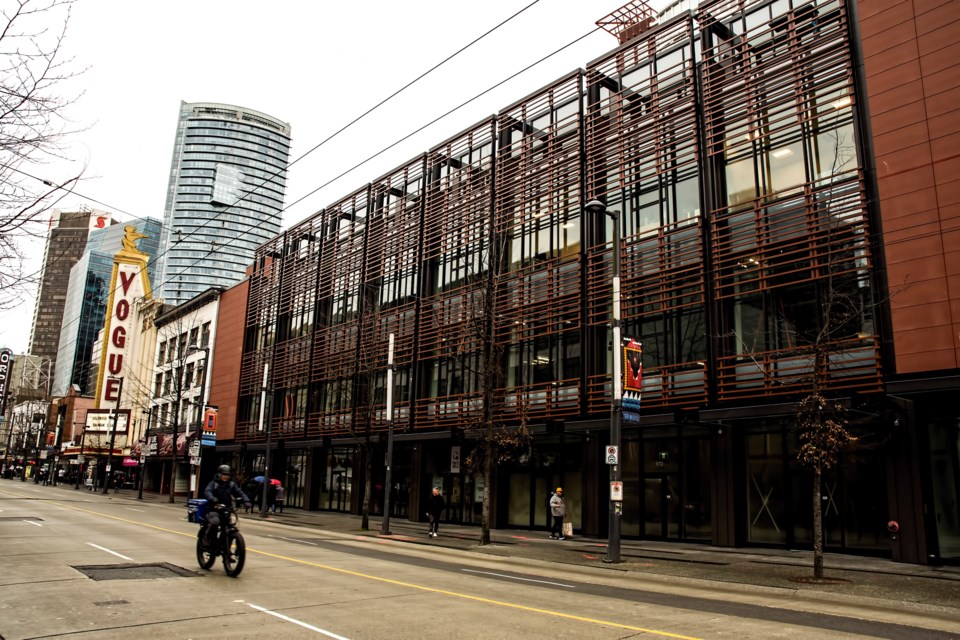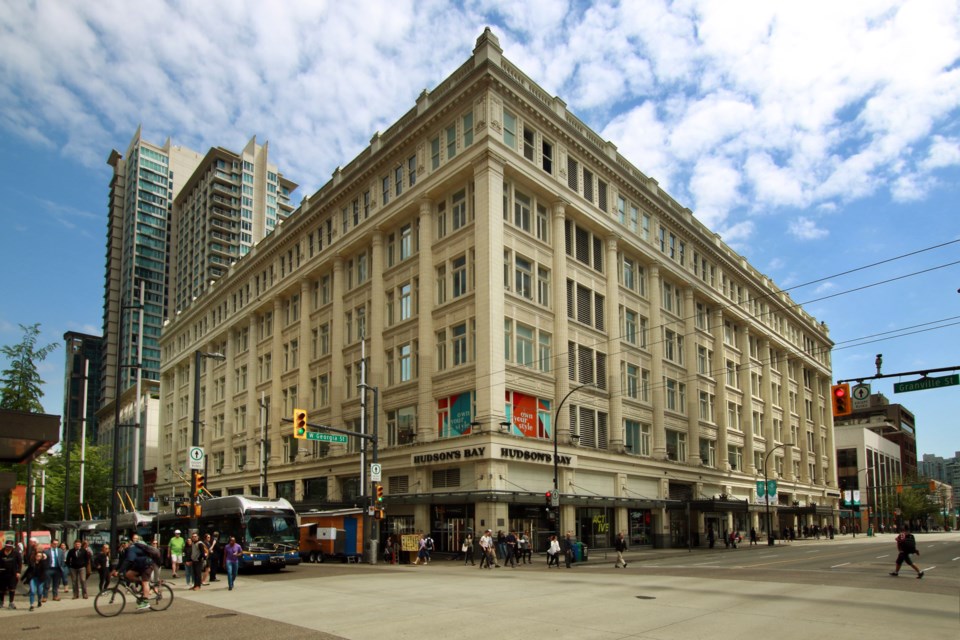Two massive retail locations at what is arguably the most accessible and central intersection in the province will soon be empty.
The already-vacant former Nordstrom Inc. footprint and the soon-to-be vacated Hudson’s Bay Co. flagship store in downtown Vancouver cast a “pretty dire” business outlook for the surrounding area, retail analyst and DIG360 owner David Gray told BIV.
The Hudson’s Bay Co. on March 25 started liquidating merchandise at its 637,000-square-foot, nine-storey Vancouver location, which includes three storeys underground. It plans to vacate the site at the northeast corner of Granville and West Georgia streets by June 30.
The company would then try to stay alive by operating six stores in Ontario and Quebec.
The Bay is in creditor protection, trying to stave off bankruptcy, as it has assets of around $3 million while it owes creditors nearly $1 billion.
CF Pacific Centre owner Cadillac Fairview, meanwhile, has let a 230,000-square-foot site it owns on the southwest corner of that intersection sit idle since June 2023, when former tenant Nordstrom ceased Canadian operations.
Much speculation has swirled about possible tenants for that site, but Cadillac Fairview multiple times has confirmed to BIV that it has yet to decide what to do with the space.
The future of the Bay building is similarly uncertain, with the iconic Canadian retailer in creditor protection.
The joint venture that owns the site is 78-per-cent owned by the Bay, with the rest owned by RioCan Real Estate Investment Trust.
It is anyone’s guess whether an entity will step in to buy the Bay’s stake in the joint venture that owns the prime piece of downtown Vancouver real estate.
Some believe redevelopment with a tower above the heritage building’s shell is likely.
Others speculate that it could be a great future space for the Vancouver Art Gallery (VAG).
Coun. Sarah Kirby-Yung told BIV, however, that if the gallery were to change its planned location, there could be a “huge input cost” because “the city does not own the Bay site.”
Indeed, the city’s contribution to the future VAG redevelopment is its donation of the city-owned southern two-thirds of the block bounded by Cambie, Dunsmuir, Beatty and West Georgia streets.
VAG's chair Jon Stovell also tossed cold water on the idea of relocating into the Bay building.
"I do a ton of renovations and I understand what goes into a special facility like a gallery, with all the ventilation requirements and all of that," said Stovell, who is also CEO at Reliance Properties. "We'd probably end up spending almost the same amount of money renovating an old building as building a new one and we still wouldn't own it. We'd be just a tenant."
City council is committed to "expediting uses and supporting vitality in the downtown core," Kirby-Yung said.
“What we don’t want is a hollowing out with the loss of key retail sites.”
Downtown Vancouver Business Improvement Association CEO Jane Talbot told BIV she hopes clarity over the Bay site’s future ownership will come soon and that whoever winds up as the site’s owner will be inspired to reinvigorate the space as soon as possible.
She added that she doubts the site will sit empty for years.
Joo Kim Tiah, CEO and owner of Holborn Group, told BIV that he had "no interest" in owning a stake in the Bay site. Holborn owns the Bay Parkade site across Seymour Street from the Bay as well as much of that city block.
Spectre of large empty retail space rattles business owners
Business owners are anxious.
“It is important that the [former Nordstrom] space be occupied with uses and retailers that will help revitalize the downtown core and stimulate people’s interest to return with new enthusiasm and curiosity,” said Kerry Bonnis, a principal at the street’s largest land owner, Bonnis Properties.
“We are afraid that the demising of the former Nordstrom space will take too long when one considers that the street needs an immediate injection of excitement and new tenancies to spark new interest coming back to the core.”
Many bar owners have recently told media that they are frustrated with the level of street homelessness, open drug use and violence along the city’s main entertainment strip.
They say that the streetscape deters visitors and could be an embarrassment for the city when visitors come in mid-2026 for the FIFA World Cup.
Bright spots include cinema-giant Cineplex last December opening its Rec Room complex on the west side of Granville Street’s 800-block.
Cineplex describes the facility as having “three floors of endless entertainment.”
It offers plenty of games, mini-golf, augmented-reality darts, axe throwing, three dining destinations, private party rooms and live entertainment.
Bonnis praised the Rec Room’s opening as having a positive effect on Granville Street.
He has nearly completed a four-story mixed-use building on the east side of Granville Street’s 900-block. Tenants such as the Canadian passport office, Taco Bell and KFC are set to move into the building that is south of the Vogue Theatre and north of an empty site that had been a 7-Eleven.
He has shelved tentative plans to redevelop the east side of the 700 block, where Bonnis Properties owns the building that houses Best Buy on the corner and then stretches north with various streetfront-retailer tenants.
Business is going well there, he said.
TJX Cos. Inc. moved its Winners store out of the Best Buy building and relocated it into larger space in the Hudson building in Granville Street’s 600 block, Bonnis said.
TJX then moved one of its other banners, Marshalls, into the former Winners space last week, he added.

Bonnis revamps proposed multi-use project above Commodore Ballroom
Bonnis’ biggest proposed project on the Granville Strip is on the east side of the 800 block of Granville Street, straddling the historic Commodore Ballroom.
He has dealt with the city for nearly eight years in attempts to redevelop that site, he said.
Last April, Bonnis scuttled a design his company had for a large building that would span the entire site, save the historic Commodore Ballroom and provide a better entrance to the Orpheum Theatre.
That project included Bonnis donating a 14,700-square-foot, three-storey performance venue, valued at $45 million, to the city. That space would have been able to host arts and culture performances and provide expanded rehearsal space for the Vancouver Symphony Orchestra.
He now is proposing a 43-storey tower immediately north of the Commodore Ballroom, and a 39-storey tower south of that iconic concert venue. Those towers’ proposed heights are 451 feet and 395 feet.
He wants city staff to work quickly so city council can vote to rezone the site by fall at the latest.
“What has been problematic with Granville Street is city staff’s delay,” he said.
“We need changes with the city to allow for immediate processing of permits for project quick-starts urgently.”
His latest proposal saves the Commodore Ballroom and there would be connecting floors between the towers built above the 1929-built nightclub.
Five levels of retail, restaurants and entertainment would make the site a destination, he said.
One thing new in Bonnis’ current proposal is that instead of building office space, Bonnis wants to build 500 rental homes and 100 hotel rooms.
He said he has not ruled out including some office space but “demand for office is a fraction of what it used to be, and office lease rates have dropped.”
Vancouver tourism advocates have long decried the city’s scarcity of hotel rooms and they tend to champion any new proposed hotel project.
It is the 500 rental homes in Bonnis’ project that could be controversial.
Former City of Vancouver chief planner Brent Toderian said planners for decades have worked on the theory that you do not put housing on Granville Street because it is an entertainment district.
He is now questioning that philosophy and is more supportive of housing on or near the street.
“The theory was, ‘There’s going to be noise and entertainment on the entertainment street, so you don’t put housing above,’” said Toderian, who owns the urban planning consultancy Toderian UrbanWORKS. “There’s some logic to that, but I’m increasingly unconvinced that the best future of Granville Street should be as an entertainment district, because there isn’t much evidence that we’ve ever been able to manage that successfully.”
Lack of success on the street is evident with the homelessness, street violence and rampant drug use that the bar owners have complained about, he said.
The result is few retailers that try to operate ventures that are adjacent to the entertainment industry, he said.
“In places where that situation is under control, in other cities, you have entertainment, like nightclubs and pubs and restaurants, but you have it mixed in with other normal sit-down restaurants, cafes, retailing etcetera, and they live somewhat harmoniously,” he said. “When the nighttime entertainment gets out of control, those other uses leave, or they don’t come at all.”
He said he has watched department stores through recent decades become less of a magnet to draw people to various cities’ downtowns.
The COVID-19 pandemic prompted rapid evolution in what kinds of real estate were in demand in cities’ downtowns because office employees started working at home, he said.
“Many of those workers never returned to working downtown,” Toderian said.
The result is that many cities are converting office space into residential space. He listed Calgary and Sacramento as prime examples.
“If we can’t count on office being the reason or the engine for downtowns, we’ve got to lean in even further on housing,” he said.
City councillors are not rejecting the idea of rental housing on Granville Street.
“Rental housing is still hugely important the city,” said Kirby-Yung. “Generally, overall, we welcome more rental projects.”






